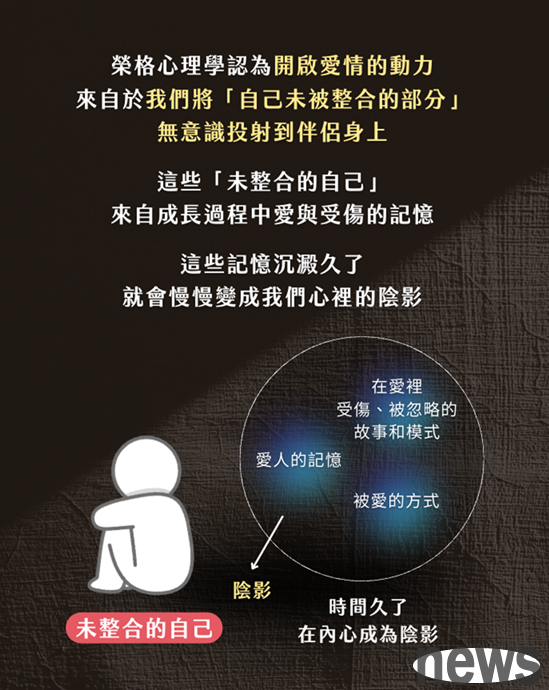We often think that "love for wrong people" is because of fate, poor vision, or that we are not sober. But Rongge psychology provides another view: The reason why we are always repeatedly injured in love and always love wrong people is not...

We often think that "love for wrong people" is because of fate, poor vision, or that we are not sober. But Rongge psychology provides another view:
The reason why we are always repeatedly injured in love and always love wrong people is not because we are not lucky or smart, but because we have an unintegrated self in our minds, and are constantly seeking fullness through love.Those who you think you "don't love" are likely to be urging your past experiences, inner desires, and untreated emotions.
The relationships you think are "fair love" are actually a deep-level inner path of call and self-integration.
Lin Guang-kei psychologist, who is good at long-term psychology, emerges from the concepts of "shadow" and "projection" of psychology, and takes you to re-see the patterns that reappear in love.
Rongge Psychology: The power of opening love is to project unintegrated parts onto our companions

榮格心理學認為,開啟愛情的動力,來自於我們將生命未被整合的部分,無意識地投射到伴侶身上。
These "un-intergrated self" are piled up by our love-loving memories from small to large. The stories and patterns of how we are loved, how we are lost, hurt, and ignored in love are all gathered into our lives bit by bit, and they are hidden in our hearts and become shadows as time passes.
From the "shadow" and "projection" in the greek psychology, to see the repeated emotional patternsThe "shadow" in the greek psychology mentioned in the previous paragraph is a sense of security: a kind of familiarity with how we are loved in the relationship.
Therefore, before the Yin influence was not yet visible, he always used repeated patterns to induce our conscious self to discover his existence.
And "projection" is a mechanism that allows the shadow to be concrete: it allows us to unconsciously map the need for how to be loved in the shadow to the other party.
So the projected companion leads to the requirements of our love characters in the film. However, after the relationship has developed for a longer time, we find that the true appearance of the other party may be different from what we imagined, or that our real needs are once again not met in the script of the reenactment of the film in the past.
At this time we blame ourselves for loving someone wrong, but never discovered that these repeated disappointments may have something to do with our shadows.
It is not a coincidence to love someone wrong, it is a misunderstanding of the familiarity! 2. How does the shadow and projection work in case of 2. [Story Case 1] Always love a cold person? In fact, it is the loneliness in repeated shadowsFor example, a person who is always attracted by a cold and distant object may have a shadow that lacks self-value and fears of being rejected.
By loving a person who is difficult to get close to, he is actually repeating his physical experience and licking the loneliness he has been familiar with since childhood. He repeatedly tries to get close, and deep in his heart he is holding the emotional need of hope to be affirmed, seen, and accepted, in order to cultivate the vacancy in the past.
But such relationships eventually lead to disappointment and continuous feeling of loss in the indifference of the company.
【Story Case II】I always want to save the other party, but it is actually a re-enactment of childhood projectionand then use a slightly different way to illustrate the example of shadow projection in love relationships.
A man who grew up in his mother's demise always looks forward to what he can do to change his mother's smile and enthusiasm, so in his close relationships after he grows up, he is always attracted by objects who are laughing for themselves, who are easily moved by their care and efforts.
However, such subjects usually have very delicate and sensitive personalities to emotions and are prone to negative emotions. Therefore, when the other party enters the low point of emotion, this man may have a shadow of the past depressed mother's wife, making him try his best to save the other party's body and mind, and take on the role of the savior.
However, I wanted to escape when I could no longer bear it, but I was self-reliantly unable to really leave.
In such a desire, this man longs for the happiness of his companionship because if he were such a mother, he could become powerful and could strongly take care of the little boy who was also fragile and needed comfort in his emotions.
Love under the shadow projection of the Rongge, what you love is the unintegrated selfHave you discovered it? What happens repeatedly in the person you love is likely to be related to the experience of how we were piled up by the memories we loved in the past.
In a sentence-changing sentence, in the love projected by shadows, you do not really love the other person, but love the part of yourself that you have not seen or not in time in your heart.
So, we can further watch the stories of how we are loved from these repeated objects and repeated relationship patterns, which are related to every topic we need to study..
How to see the inner subject from "repeated love for the same people" through the sympathy psychology, he would need to see first:When he was looking forward to the other person's smile and passionate response, how come from his own shadow memory?
How did I digest and suppress my needs by myself since I was a child during my mother's long-term depression? And the way I am now loved can only be fulfilled by taking care of others and changing the happiness of others?
Next, more questions that need to be reflected and observed include:
The focus on self-value:
He needs to gain self-affirmation and value through hard work and care, and his inner self is full of doubts and shortcomings in his own value.
Emotional needs not been touched:
He longs to be seen, be reminiscent of love and passion, but has never truly felt that he deserves to be accepted and loved without conditions.
The shadow of the character of the savior:
He unconsciously assumed the responsibility of his companionship and tried to "save" the other party. This is actually a replay of the guilt and powerless feeling that he had caused inability to save his mother in childhood.
cannot accept his own vulnerability and powerlessness:
He cannot allow himself to show weakness, helplessness or needy, and believes that he must always remain strong and become a support for others' feelings.
Through observing these subjects and shadows, this man gradually put down his past mode and began to learn that he also needs to be loved and supported, thereby establishing a healthier and balanced secret relationship.
How to break the cycle of "love error"? The occurrence of the 3-step plot of the plot that is repeatedly injured by love is always a hope, hoping that the loss of being loved in the past can finally have the chance to truly satisfyThe sentence change, the relationship power of love with the same person will be repeated not only from the reenactment of the past shadow, but also from the expectation of a person who can break the plot of the plot. Therefore, every projection holds a hope, hoping that the person who loves the same person this time can be different from the past.
How can varied this time's love? How to break and adapt the reenactment of the film?
Lin Guangyi psychologist mentioned that we must withdraw from the projection of shadows and brighten our eyes, allow our companions to truly appear, and we must be able to observe how we are controlled by the shadows so that we can gradually move towards a more complete self.
The following will be developed from the perspective of tribute psychology and psychologists, and share 3 steps to accompany you to repetitively suffer from love:
[Step 1] How to observe your unmet needs and subjects?View past love relationship patterns:
Find similar dilemmas, problems and characteristics
Then ask yourself, what kind of problems usually repeat? When do you start to feel a dilemma in the relationship?
Record and reflection: Record the emotional reactions of your interactions with your companions every day, and discover in the ups and downs of emotions:
What do you care about?
What kind of response will bring a feeling of disappointment when you are a partner?
What kind of reaction will make you feel happy and happy?
Find the shadow story behind the emotion: After the emotional observation practice becomes more and more familiar with the relationship, we further think about the loss or satisfaction of these emotions, and find the memory of the shadow.
What is the story behind these emotional loss or satisfaction?
How do these emotions have something to do with your memories of being loved in the past?
[Step 2] After seeing the yin film, how to modify and break through?Accept the needs of the protagonist in the play: to correctly view the way in which your emotional desires in the play are satisfied, and to learn to express.
For example: A man begins to be honest with the ground and expresses his emotional needs. When his partner is in a low mood, he can try, "I feel helpless now. I hope you know that I also need your support and understanding."
Distinguish the difference between the true appearance of the partner and the script: How can the true appearance of the partner rationally reflect on the true appearance of the partner and the difference between the partner and the partner you expect? Practice hearing partners have their own real ideas and needs.
For example: He began to pay attention to the true personality of his partner, not always helpless or vulnerable, but was able to take care of his emotions; he gradually learned to believe that his partner was able to respond to him, rather than taking on all his responsibilities on his shoulders.
turns shadow into a story that can be told in relationships: the interaction that re-enacts the relationship between potential consciousness turns into a story that can be told in thoughts, so that each other can understand how important it is to you and me? What are the different meanings?
For example: He can come to his partner, "I'm especially scared when you feel depressed, because this reminds me of the feeling that when I was a child, I was unable to do anything to face my depressed mother; I hope we can discuss together how to face ups and downs in each other's feelings. . ”
【Step 3】 Seek professional assistanceThrough personal counselors and companions, we can explore the incisiveness of our love, identify undiscovered shadow stories, learn to establish new emotional interaction modes, and gradually dispel the past and repeat the cycle.
Every time of love is an opportunity to see oneself once,Every time of so-called "love" is actually an opportunity to see oneself once.
Great psychology encourages us to turn our emotional disappointment and frustration into the inner world and understand our real needs and desires.
Remember, next time I ask myself "Why do I always love wrong people?", I tried to ask more: "In this relationship, did I see the story of how I long for how I want to be loved? How can I be different when I desire this time?"
When we bravely accept the inner shadow and the unintegrated self, our love will gradually become mature and full.